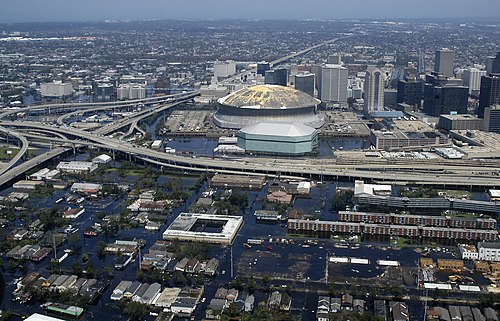Weathernoun
The short term state of the atmosphere at a specific time and place, including the temperature, relative humidity, cloud cover, precipitation, wind, etc.
Weathernoun
Unpleasant or destructive atmospheric conditions, and their effects.
Weathernoun
(nautical) The direction from which the wind is blowing; used attributively to indicate the windward side.
Weathernoun
A situation.
Weathernoun
(obsolete) A storm; a tempest.
Weathernoun
(obsolete) A light shower of rain.
Weatheradjective
Facing towards the flow of a fluid, usually air.
Weatherverb
To expose to the weather, or show the effects of such exposure, or to withstand such effects.
Weatherverb
(by extension) To sustain the trying effect of; to bear up against and overcome; to endure; to resist.
Weatherverb
To break down, of rocks and other materials, under the effects of exposure to rain, sunlight, temperature, and air.
Weatherverb
(nautical) To pass to windward in a vessel, especially to beat 'round.
Weatherverb
(nautical) To endure or survive an event or action without undue damage.
Weatherverb
(falconry) To place (a hawk) unhooded in the open air.
Weathernoun
The state of the air or atmosphere with respect to heat or cold, wetness or dryness, calm or storm, clearness or cloudiness, or any other meteorological phenomena; meteorological condition of the atmosphere; as, warm weather; cold weather; wet weather; dry weather, etc.
Weathernoun
Vicissitude of season; meteorological change; alternation of the state of the air.
Weathernoun
Storm; tempest.
Weathernoun
A light rain; a shower.
Weatherverb
To expose to the air; to air; to season by exposure to air.
Weatherverb
Hence, to sustain the trying effect of; to bear up against and overcome; to sustain; to endure; to resist; as, to weather the storm.
Weatherverb
To sail or pass to the windward of; as, to weather a cape; to weather another ship.
Weatherverb
To place (a hawk) unhooded in the open air.
Weatherverb
To undergo or endure the action of the atmosphere; to suffer meteorological influences; sometimes, to wear away, or alter, under atmospheric influences; to suffer waste by weather.
Weatheradjective
Being toward the wind, or windward - opposed to lee; as, weather bow, weather braces, weather gauge, weather lifts, weather quarter, weather shrouds, etc.
Weathernoun
the meteorological conditions: temperature and wind and clouds and precipitation;
Weatherverb
face or endure with courage;
Weatherverb
cause to slope
Weatherverb
sail to the windward of
Weatherverb
change under the action or influence of the weather;
Weatheradjective
towards the side exposed to wind
Weather
Weather is the state of the atmosphere, describing for example the degree to which it is hot or cold, wet or dry, calm or stormy, clear or cloudy. On Earth, most weather phenomena occur in the lowest layer of the planet's atmosphere, the troposphere, just below the stratosphere.
Whetherdeterminer
(obsolete) Which of two.
Whetherpronoun
(obsolete) Which of two.
Whetherconjunction
(obsolete) Introducing a direct interrogative question (often with correlative or) which indicates doubt between alternatives.
Whetherconjunction
Used to introduce an indirect interrogative question that consists of multiple alternative possibilities (usually with correlative or).
Whetherconjunction
Without a correlative, used to introduce a simple indirect question.
Whetherconjunction
Used to introduce a disjunctive adverbial clause which qualifies the main clause of the sentence (with correlative or).
Whetherpronoun
Which (of two); which one (of two); - used interrogatively and relatively.
Whetherconjunction
In case; if; - used to introduce the first or two or more alternative clauses, the other or others being connected by or, or by or whether. When the second of two alternatives is the simple negative of the first it is sometimes only indicated by the particle not or no after the correlative, and sometimes it is omitted entirely as being distinctly implied in the whether of the first.










